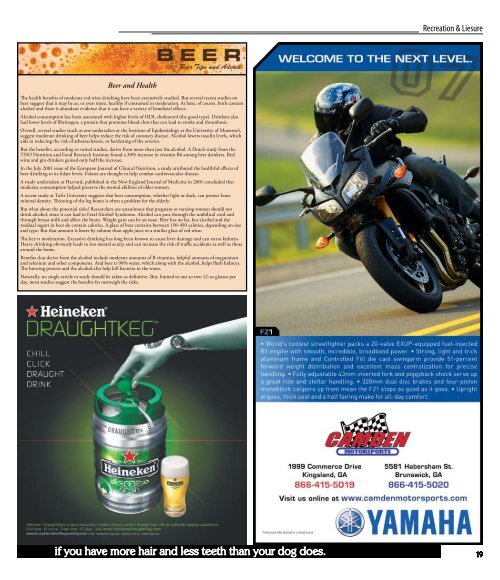Erin Moore - Harmonious Monks - iwantaBUZZ.com
Erin Moore - Harmonious Monks - iwantaBUZZ.com
Erin Moore - Harmonious Monks - iwantaBUZZ.com
You also want an ePaper? Increase the reach of your titles
YUMPU automatically turns print PDFs into web optimized ePapers that Google loves.
Recreation & Liesure<br />
Beer and Health<br />
The health benefits of moderate red wine drinking have been extensively studied. But several recent studies on<br />
beer suggest that it may be as, or even more, healthy if consumed in moderation. At base, of course, both contain<br />
alcohol and there is abundant evidence that it can have a variety of beneficial effects.<br />
Alcohol consumption has been associated with higher levels of HDL cholesterol (the good type). Drinkers also<br />
had lower levels of fibrinogen, a protein that promotes blood clots that can lead to stroke and thrombosis.<br />
Overall, several studies (such as one undertaken at the Institute of Epidemiology at the University of Muenster),<br />
suggest moderate drinking of beer helps reduce the risk of coronary disease. Alcohol lowers insulin levels, which<br />
aids in reducing the risk of atherosclerosis, or hardening of the arteries.<br />
But the benefits, according to varied studies, derive from more than just the alcohol. A Dutch study from the<br />
TNO Nutrition and Food Research Institute found a 30% increase in vitamin B6 among beer drinkers. Red<br />
wine and gin drinkers gained only half the increase.<br />
In the July 2001 issue of the European Journal of Clinical Nutrition, a study attributed the healthful effects of<br />
beer drinking to its folate levels. Folates are thought to help <strong>com</strong>bat cardiovascular disease.<br />
A study undertaken at Harvard, published in the New England Journal of Medicine in 2001 concluded that<br />
moderate consumption helped preserve the mental abilities of older women.<br />
A recent study at Tufts University suggests that beer consumption, whether light or dark, can protect bone<br />
mineral density. Thinning of the leg bones is often a problem for the elderly.<br />
But what about the potential risks? Researchers are unanimous that pregnant or nursing women should not<br />
drink alcohol, since it can lead to Fetal Alcohol Syndrome. Alcohol can pass through the umbilical cord and<br />
through breast milk and affect the brain. Weight gain can be an issue. Beer has no fat, but alcohol and the<br />
residual sugars in beer do contain calories. A glass of beer contains between 150-450 calories, depending on size<br />
and type. But that amount is lower by volume than apple juice or a similar glass of red wine.<br />
The key is moderation. Excessive drinking has long been known to cause liver damage and can stress kidneys.<br />
Heavy drinking obviously leads to less mental acuity and can increase the risk of traffic accidents as well as those<br />
around the home.<br />
Benefits that derive from the alcohol include moderate amounts of B vitamins, helpful amounts of magnesium<br />
and selenium and other <strong>com</strong>ponents. And beer is 90% water, which along with the alcohol, helps flush kidneys.<br />
The brewing process and the alcohol also help kill bacteria in the water.<br />
Naturally, no single article or study should be taken as definitive. But, limited to one to two 12-oz glasses per<br />
day, most studies suggest the benefits far outweigh the risks.<br />
if you have more hair and less teeth than your dog does.<br />
19






